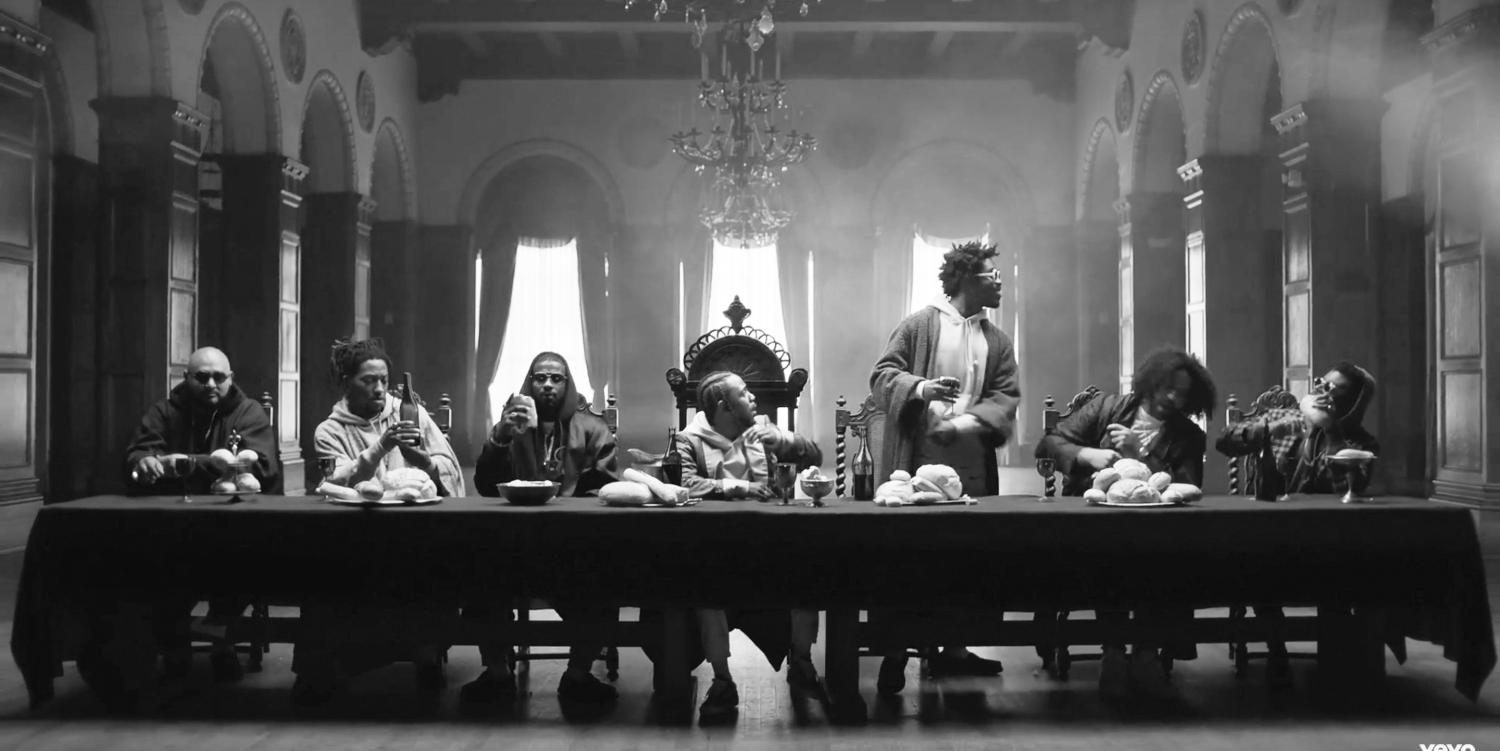Kendrick Lamar’s new album is hotter than hellfire
May 19, 2017
After releasing two classic albums, Compton’s Kendrick Duckworth Lamar reaches canonization as a “Black Beatle” as he stands at a point in his career where virtually nothing can go wrong. As he makes his way into the conversation as one of the greatest rappers of all time, his latest release, “DAMN,” is viewed as nothing short of what an artist of such caliber can produce. Listeners’ ears experience what is yet another block in the monument to the artistry of K. Dot.
“DAMN” itself is a journey through Kendrick’s soul and mind with many tracks throughout the album exist as hallmarks and crossroads in his journey through life, with the first being the parable narrated by Kendrick as the album swells into listeners’ minds. Kendrick personifies Justice as a blind woman. She appears to be struggling to find a lost object. K. Dot offers to help the woman, asking whether he can “be of assistance” and tells her that it “seems that you’ve lost something.” Justice is quick to agree. “Your life,” she echoes as the crack of a gunshot rings out, launching the entry into the life, mind and soul of Kendrick, which ironically starts with his death.
The gunshot that ends “BLOOD” transitions to the only song that could follow such a stomach churning twist. “DNA” is a solid three minutes and 42 seconds of hard bass and bar after bar of the most invigorating rapping that the year has seen. Kendrick discusses what he is made of, the traits that define him as a person, his heritage and the metaphorical gang war that he internally struggles with. “DNA” defines itself as one of the most lyrically aggressive tracks on the album.
He includes a clip of Geraldo Rivera stating, “This is why hip-hop has done more damage to young African-Americans than racism in the past few years.” Then he proceeds to ignore the sample and continues his relentless assault on the rest of those who have disrespected him, leaving listeners to regard Rivera as simply just another critic who is either horribly misguided or intentionally ignorant.
Perhaps the album’s most surprising track is “XXX,” which features venerated band U2. Placed right after the song “LOVE,” Kendrick speaks as to what he would do for the ones he loves the most. “XXX” sets itself part with the ethereal instrumentation and Radiohead-like change in beat and time signature.
The track opens with a sound on the instrumentals and vocals that could be mistaken for Big Sean to the casual ear. A piano chord then echoes until it makes a transition into a violently energetic and agonized verse, with an instrumental sounding like the low roar of a Lamborghini engine swelling in and out while sirens sound periodically. A close friend calls K. Dot and asks him for closure after the murder of his son. Unable to hold back, he tells him exactly what he would do if someone killed his son. He raps, “I’ll catch a n***a leavin’ service if that’s all I got/I’ll chip a n***a, then throw the blower in his lap/Walk myself to the court like, “B****, I did that!”
As with his critically acclaimed song, “The Blacker the Berry,” Kendrick points out his own hypocrisy. There is no “Black Power” for Kendrick when his own family is being attacked. Suddenly, the beat switches back to piano, drum machine, and bass laden chill-hop. As the first verse ends, the setting switches to a speech Kendrick is giving on gun control, once more revealing himself as a hypocrite. K.Dot hits the nail on the head in the second verse by labeling politicians as hypocrites too. They call for an end to violence in the streets while conducting violence in other nations. He spits, “Hail Mary, Jesus and Joseph/The great American flag/Is wrapped and dragged with explosives.” Coincidentally, the same day the album released, the “Mother of All Bombs” was dropped in an effort to combat ISIS, showing that the American flag is indeed “dragged with explosives.” As the track closes, Bono of U2 sings about the influence of music and is about to take an introspective look when he is cut off by the next song, “FEAR.”
Even the introduction of “FEAR” radiates waves of symbolism. When cutting off Bono’s verse, it shows that fear is what stops us from looking inside ourselves which is applicable to the country as a whole. It’s essentially one of the many reasons why institutional racism has not been solved. Kendrick speaks directly to God asking him why he has to suffer and the rest of the track is not him finding that answer, but rather the fears that he has already experienced. The first verse weaves a tale of 7 year-old Kendrick at home terrified of his mother. He understands, however, that his mom just wants him to succeed. At age 17, K. Dot fears death, using vivid imagery to describe the hazards of living in Compton. At age 27, he fears losing his fame and his talent. If everything came crashing down around him, he would be back where he started at square one which is the last place he wants to be.
To wrap up the album, Kendrick delivers “Duckworth,” an origin story. It begins with Anthony, a young gang member, with a very troubled past. The perspective then shifts to a character called “Ducky,” a young man arriving from Chicago with a wife and young child. Finding employment in the local KFC, he quickly learns about Anthony’s fearsome reputation and seeks to please him by offering him extra food whenever he came to the restaurant. It is on a shift one night that Ducky becomes acquainted with the crime baron. Fresh out of a murder case escaping conviction, Anthony resumes his life of crime and hustling. He decides to stick up the local KFC, a site with a history of being a site of gang interest. Anthony holds the employees of his local Kentucky Fried Chicken at gunpoint to extort cash to re-cement his criminal reputation. Because of Anthony’s self-control and Ducky’s own resourcefulness, no one died that night, leaving Anthony and Ducky. Kendrick reveals towards the end that Anthony is in fact the man behind the label Top Dawg Entertainment to which Kendrick is signed to and “Ducky” is none other than Kendrick’s father. He realizes how lucky he is to be alive as opposed to dying. The very end of the track is a gunshot followed by the entire album being rewinded to the chilling voice of Kendrick repeating, “So I was taking a walk the other day.” The experiences recorded in this album are all that flashes before his eyes as he faces that which is most feared and avoided: death of the mind, body and soul.
“DAMN” has a massive legacy to bear on its shoulders, since Lamar’s previous album, ”To Pimp a Butterfly,” stands as one of the greatest hip-hop albums to be produced in this century. The polished storytelling, nostalgia, and beats of “good kid, m.A.A.d. City” remain with many fans of Kendrick. While not quite reaching the sonic and lyrical heights of TPAB but still going deeper than the ideas and themes presented in GKMC, DAMN sits somewhere between the two, a combination of the smoothly flowing bars and beats of GKMC while the deep introspective lyricism of “To Pimp A Butterfly” interlaces itself between the swirling guitars, drum machines and hard bass. “DAMN” is not Kendrick Lamar’s greatest achievement, nor is it superior to its predecessor. But it is something that stands as its own, and is most certainly a contender for album of the year.



